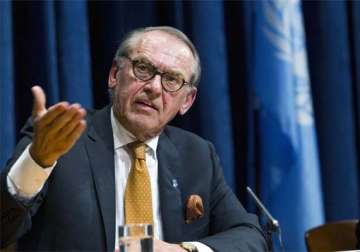UN asks people to give $1 each for Syrian Refugees
United Nations: The World Food Program launched an unusual campaign on Wednesday to raise $1 contributions from 64 million people around the world so it can restore food vouchers to Syrian refugees who won't be

United Nations: The World Food Program launched an unusual campaign on Wednesday to raise $1 contributions from 64 million people around the world so it can restore food vouchers to Syrian refugees who won't be getting any UN help in December.
The 72-hour campaign effort comes two days after the UN food agency announced it was forced to suspend food vouchers to 1.7 million Syrians refugees because it doesn't have the $64 million to cover the cost. The WFP warned the suspension would force many Syrian families who fled to Jordan, Lebanon, Turkey and Egypt to go hungry.
The suspension of the vouchers highlighted the difficulty the UN has had in raising funds for soaring humanitarian needs not only in Syria but around the world. Governments, aid organizations and regional bodies are increasingly overwhelmed with appeals for assistance.
In a speech on Wednesday, UN Deputy Secretary-General Jan Eliasson said more than 100 million people are in need of humanitarian assistance today - three times as many as 10 years ago. He said the amount requested through humanitarian appeals has risen nearly 600 percent in the past decade, from $3 billion to $17.9 billion.
"The humanitarian landscape is darkening and changing faster than ever before," Eliasson said.
WFP is asking people to visit its website to donate online.
"Even one dollar can make a difference," WFP Executive Director Ertharin Cousin said in a statement. "We're saying to people: 'For you it's a dollar, for them it's a lifeline.'"
The WFP is also asking the public to swap their profile picture on Twitter and Facebook with a 'badge' representing the $1 campaign.
Eliasson said humanitarian crises in Syria, Iraq, Central African Republic, protracted conflicts in Africa, the Ebola epidemic and natural disasters "are seriously testing the limits and response capacities of individuals, organizations, governments and the United Nations."
He called the situation this year "a loud warning signal" of things to come, pointing to a growing number of "factionalized conflicts," the impact of climate change, big demographic shifts and massive displacement, serious food insecurity, rapid urbanization and the growth of slums, and critical water scarcity.
An estimated 12.2 million Syrians are in need of assistance.
WFP needed $1 billion to help Syrian refugees this year and received just $484 million, WFP spokeswoman Bettina Luescher said. It needed about $913 million to help Syrians who fled their homes and remain in the country but got only $350 million.
Over the next three months, she said, WFP will needs $262 million to support Syrian refugees in neighboring countries and $92 million for its work inside Syria.
At a UN donors conference in Kuwait City in January, nearly 40 nations and key organizations pledged $2.4 billion for overall needs in Syria in 2014. But 24 percent of the pledges - totaling nearly $585 million - have not been paid, according to the UN humanitarian office's Financial Tracking Service.
The Tracking Service figures, based on information provided by donors and recipient organizations, showed that an NGO consortium owes $207 million, Kuwait owes $200 million, the European Commission owes $51 million, Saudi Arabia $43 million, Italy $23 million, Iraq $13 million, Qatar about $11 million, and Oman and Switzerland about $10 million.
Ten other countries owed smaller amounts, but New Zealand overpaid its nearly $4.1 million pledge by about $86,000.